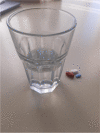Resisting and disrupting HIV-related stigma: a photovoice study
- PMID: 37864144
- PMCID: PMC10590010
- DOI: 10.1186/s12889-023-16741-1
Resisting and disrupting HIV-related stigma: a photovoice study
Abstract
Background: The stigma associated with human immunodeficiency virus (HIV) is a significant global public health concern. Health care providers and policy makers continue to struggle with understanding and implementing strategies to reduce HIV-related stigma in particular contexts and at the intersections of additional oppressions. Perspectives and direction from people living with HIV are imperative.
Methods: In this project we amplified the voices of people living with HIV about their experiences of HIV-related stigma in Manitoba, Canada. We used an arts-based qualitative case study research design using photovoice and narrative interviews. Adults living with HIV participated by taking pictures that represented their stigma experiences. The photos were a catalyst for conversations about HIV and stigma during follow-up individual narrative interviews. Journaling provided opportunities for participants to reflect on their experiences of, and resistance to, stigma. Interviews were audio recorded and transcribed. Photos, journals, and transcribed interviews were analyzed using inductive qualitative methods RESULTS: Through pictures and dialogue, participants (N = 11; 64% women) expressed the emotional and social impacts of stigmas that were created and supported by oppressive structures and interpersonal attitudes and behaviours. These experiences were compounded by intersecting forms of oppression including racism, sexism, and homophobia. Participants also relayed stories of their personal strategies and transitions toward confronting stigma. Strategies were themed as caring for oneself, caring for children and pets, reconstituting social support networks, and resisting and disrupting stigma. Participants made important recommendations for system and policy change.
Conclusions: These stories of oppression and resistance can inspire action to reduce HIV-related stigma. People living with HIV can consider the strategies to confront stigma that were shared in these stories. Health care providers and policy makers can take concerted actions to support peoples' transitions to resisting stigmas. They can facilitate supportive and anti-oppressive health and social service systems that address medical care as well as basic needs for food, shelter, income, and positive social and community connections.
Keywords: HIV stigma; Oppression; Qualitative research; Resistance.
© 2023. BioMed Central Ltd., part of Springer Nature.
Conflict of interest statement
The authors declare no competing interests.
Similar articles
-
Perceptions of intersectional stigma among diverse women living with HIV in the United States.Soc Sci Med. 2018 Jul;208:9-17. doi: 10.1016/j.socscimed.2018.05.001. Epub 2018 May 4. Soc Sci Med. 2018. PMID: 29753137 Free PMC article.
-
HIV, gender, race, sexual orientation, and sex work: a qualitative study of intersectional stigma experienced by HIV-positive women in Ontario, Canada.PLoS Med. 2011 Nov;8(11):e1001124. doi: 10.1371/journal.pmed.1001124. Epub 2011 Nov 22. PLoS Med. 2011. PMID: 22131907 Free PMC article.
-
Geographic differences in the experiences of HIV-related stigma for women living with HIV in northern and rural communities of Ontario, Canada.Rural Remote Health. 2018 Jul;18(3):4522. doi: 10.22605/RRH4522. Epub 2018 Jul 12. Rural Remote Health. 2018. PMID: 30037269
-
Stigma, HIV and health: a qualitative synthesis.BMC Public Health. 2015 Sep 3;15:848. doi: 10.1186/s12889-015-2197-0. BMC Public Health. 2015. PMID: 26334626 Free PMC article. Review.
-
The use of photovoice in research with adolescents living with HIV in Africa: A scoping review.J Public Health Afr. 2025 Jan 31;16(1):625. doi: 10.4102/jphia.v16i1.625. eCollection 2025. J Public Health Afr. 2025. PMID: 40475233 Free PMC article. Review.
Cited by
-
The impact of photovoice on mental health and stigma: A systematic review and meta-analysis.PLOS Glob Public Health. 2025 Jul 22;5(7):e0004272. doi: 10.1371/journal.pgph.0004272. eCollection 2025. PLOS Glob Public Health. 2025. PMID: 40694586 Free PMC article.
-
Stigma and health outcomes in multiple sclerosis: a systematic review.BMC Neurol. 2024 Sep 14;24(1):346. doi: 10.1186/s12883-024-03853-3. BMC Neurol. 2024. PMID: 39271990 Free PMC article.
-
Editorial: Exploring HIV disclosure challenges and approaches around the globe.Front Public Health. 2024 Jan 9;11:1357915. doi: 10.3389/fpubh.2023.1357915. eCollection 2023. Front Public Health. 2024. PMID: 38264248 Free PMC article. No abstract available.
-
Self-perceived stigma in people living with HIV in Spain: a mixed-methods study.Infez Med. 2025 Jun 1;33(2):190-202. doi: 10.53854/liim-3302-5. eCollection 2025. Infez Med. 2025. PMID: 40519352 Free PMC article.
-
Ubuntu Is a Critical Component in the Fight against Human Immunodeficiency Virus and Tuberculosis Stigma: Nursing Students' Perceptions.Int J Environ Res Public Health. 2024 Feb 15;21(2):229. doi: 10.3390/ijerph21020229. Int J Environ Res Public Health. 2024. PMID: 38397718 Free PMC article.
References
-
- World Health Organization. HIV AIDS 2022. Available at: https://www.who.int/news-room/fact-sheets/detail/hiv-aids. Accessed 13 Jan 2022.
Publication types
MeSH terms
Grants and funding
LinkOut - more resources
Full Text Sources
Medical




